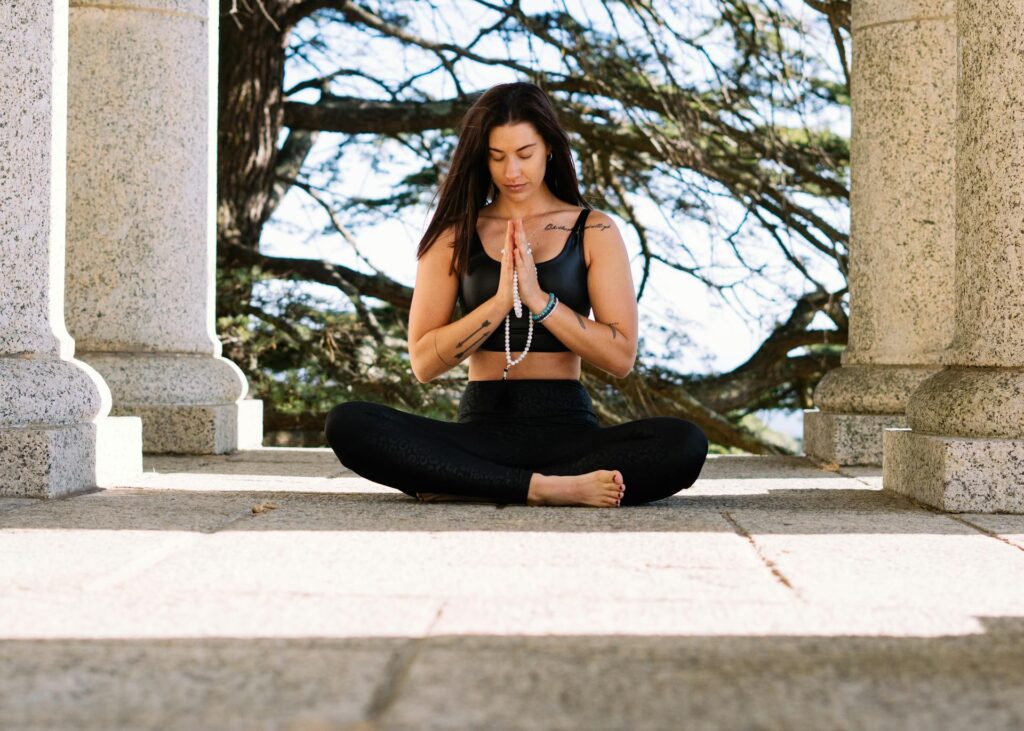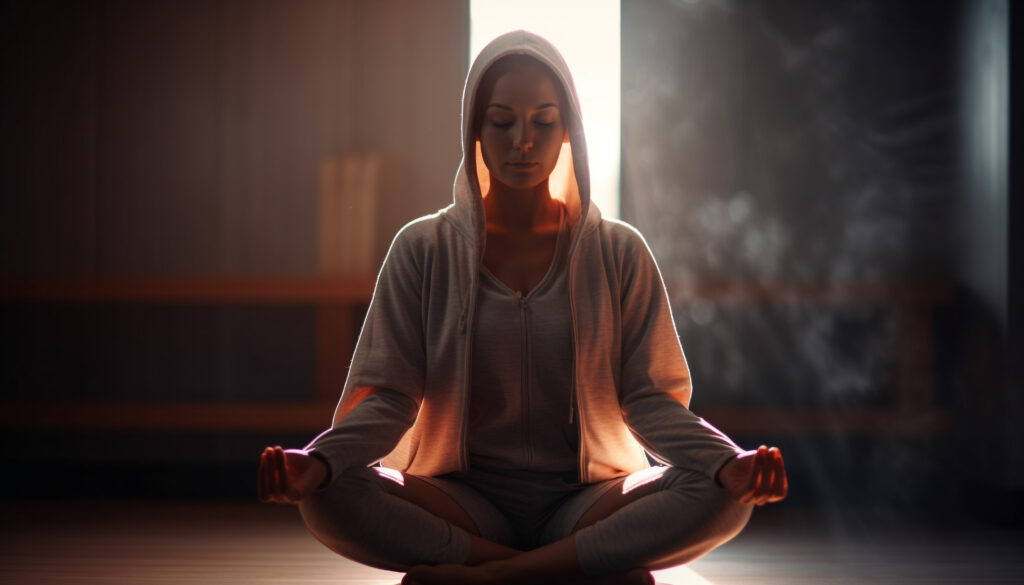
Have you ever stopped in the middle of a busy day and wondered, “Wait, why am I feeling this way?” We all get caught up in the hustle and bustle of life, but sometimes it’s important to take a step back and reflect on ourselves. A constant connectivity and information overload have become common.
In such conditions, individuals often find themselves overwhelmed and disconnected from their true selves. This is where self-reflection meditation comes in. This article delves into the essence of self-reflection meditation, exploring its origins, techniques, benefits, and its profound impact on the mind, body, and spirit.
What is Self-Reflection Meditation?
Self-reflection can be considered a tool that helps an individual connect to himself. It is generally defined as:
“ A thoughtful practice that encourages you to turn your attention inward, exploring your thoughts, emotions, and experiences with a sense of mindfulness and curiosity. ”
It’s like taking a mental inventory of yourself, noticing what’s going on inside without judgment. By quieting your mind and focusing inwards, you can gain valuable insights into who you are, what motivates you, and how you react to situations.
Other meditation techniques which are generally the traditional ones mainly focus on clearing the mind and achieving a state of deep relaxation. However, self-reflection medication centers gain insights into your own thoughts and feelings. It is a process of self-inquiry, a journey to the inner realms of the mind where you can observe, analyze, and understand yourself on a deeper level.
Why is Self-Reflection Meditation Important?
In our fast-paced world, it’s easy to lose touch with ourselves. We might make decisions on autopilot, react to situations impulsively, or simply not understand why we feel a certain way. Self-reflection meditation can help us:
- Improve self-awareness: By observing your thoughts and feelings without judgment, you become more aware of your inner world. This can help you identify your strengths and weaknesses, values, and motivations.
- Manage stress: When you’re constantly bombarded with stimuli, it can be easy to feel overwhelmed. Self-reflection meditation can help you de-stress by giving you a space to quiet your mind and process your emotions.
- Boost emotional intelligence: Emotional intelligence is the ability to understand and manage your own emotions, as well as recognize and respond to the emotions of others. Self-reflection meditation can help you develop this important skill.
- Make better decisions: When you’re more aware of yourself, you can make choices that are aligned with your values and goals. This can lead to a more fulfilling and meaningful life.
- Increase self-compassion: Sometimes we can be our own worst critics. Self-reflection meditation can help us develop self-compassion, allowing us to accept ourselves with all our flaws and imperfections.
Who Can Benefit From Self-Reflection Meditation?
Anyone can benefit from self-reflection meditation! Whether you’re a busy professional, a stay-at-home parent, or a student, taking some time for self-reflection can be incredibly helpful. It’s a practice that can be adapted to fit into any lifestyle.
How to Get Started with Self-Reflection Meditation?
Self-reflection meditation is a simple practice that anyone can do. Here are some tips to get you started:
- Find a quiet space: Choose a place where you won’t be interrupted. It can be your bedroom, a meditation room, or even a quiet corner of your living room.

- Set a timer: Start with short meditation sessions, like 5-10 minutes. As you get more comfortable, you can gradually increase the duration.
- Get comfortable: Sit or lie down in a comfortable position. You can close your eyes or keep them gently open, whichever feels more natural for you.
- Focus on your breath: Take slow, deep breaths and pay attention to the sensation of your breath moving in and out of your body. This will help to anchor you in the present moment.
- Observe your thoughts and feelings: As you meditate, thoughts and feelings will inevitably arise. Don’t try to push them away or judge them. Simply observe them with a sense of curiosity and detachment.
- Let go: If your mind wanders, gently bring your attention back to your breath. It’s natural for your mind to wander, so don’t get discouraged.
- Be patient: Like any skill, self-reflection meditation takes practice. Be patient with yourself and don’t expect instant results.
Also Read: Discover the Power of 7 Chakra Meditation: A Journey to Inner Balance and Healing
Here are some additional tips to enhance your self-reflection meditation practice:
- Journaling: After your meditation session, take a few minutes to write down your thoughts and feelings. This can help you to gain further insights from your meditation experience.
- Guided meditation: There are many guided self-reflection meditations available online and in apps Headspace, Calm. These meditations can be a helpful way to get started, especially if you’re new to meditation.
- Mindfulness exercises: Practicing mindfulness throughout the day can help you to become more aware of your thoughts and feelings. For example, try taking a few mindful breaths when you’re feeling stressed or overwhelmed.
Self-reflection meditation is a journey, not a destination. The more you practice, the more you will learn about yourself and the world around you. It’s a powerful tool for personal
Common Challenges in Self-Reflection Meditation (and How to Overcome Them)
Even with the best intentions, self-reflection meditation can be challenging at times. Here are some common hurdles you might encounter and tips on how to overcome them:
- A wandering mind: It’s natural for your mind to wander during meditation. Don’t get discouraged! When you notice your mind has drifted, gently bring your attention back to your breath. Think of it like training a puppy – with patience and practice, you’ll get better at focusing your attention.
- Feeling restless: Sitting still for even a short period can be difficult, especially if you’re not used to it. If you find yourself feeling restless, try some gentle stretches or mindful walking meditation before sitting down to meditate.

- Feeling bored: Meditation isn’t about achieving some kind of mental state or chasing after exciting experiences. It’s about observing your inner world with curiosity. If you find yourself feeling bored, simply acknowledge the feeling and return your focus to your breath.
- Self-criticism: During self-reflection, you might become aware of negative thoughts or emotions about yourself. It’s important to be kind and compassionate towards yourself. Remember, everyone has flaws and imperfections.
- Difficulty letting go: Sometimes we get attached to our thoughts and feelings. The key is to observe them without judgment and then let them go. Imagine them like leaves floating down a stream – you acknowledge them as they pass by, but you don’t cling to them.
Self-Reflection Meditation Techniques
There are different techniques you can use for self-reflection meditation. Here are a few to explore:
- Body scan meditation: In this meditation, you focus your awareness on different parts of your body, noticing any sensations of tension, pain, or relaxation. This can help you to become more aware of how your body is holding onto emotions.
- Loving-kindness meditation: This meditation cultivates feelings of love and compassion for yourself and others. It can be a powerful tool for developing self-compassion and reducing self-criticism.
- Mantra meditation: In this meditation, you silently repeat a mantra (a word or phrase) to yourself. This can help to quiet your mind and focus your attention. A simple mantra like “peace” or “calm” can be effective here.
Benefits of Self-Reflection Meditation Beyond the Individual
The benefits of self-reflection meditation extend far beyond the individual. When we become more aware of ourselves, we’re better able to understand and connect with others. This can lead to improved relationships, increased empathy, and a more peaceful and compassionate world.
Self-reflection meditation can also empower us to make positive changes in the world. By understanding our values and motivations, we can become more conscious consumers, responsible citizens, and advocates for causes we care about.
Final Thoughts
Self-reflection meditation is a simple yet powerful tool for personal growth and transformation. By taking some time each day to quiet your mind and reflect on your inner world, you can gain valuable insights into who you are and what matters most to you. With consistent practice, you can cultivate greater self-awareness, manage stress more effectively, and make choices that lead to a more fulfilling and meaningful life.
So why not give self-reflection meditation a try today? You might be surprised at what you discover about yourself.
FAQs: Self-Reflection Meditation
Q.Isn’t self-reflection meditation just another word for introspection?
Self-reflection meditation and introspection are similar, but there’s a subtle difference. Introspection is the act of examining your own thoughts and feelings. Self-reflection meditation takes introspection a step further by incorporating mindfulness. Mindfulness is the practice of paying attention to the present moment without judgment. During self-reflection meditation, you observe your thoughts and feelings with a sense of curiosity and detachment, rather than getting caught up in them.
Q.Is self-reflection meditation a religious practice?
Self-reflection meditation can be a spiritual practice, but it’s not inherently religious. Many meditation traditions come from religious backgrounds, but the core principles of self-reflection meditation – focusing on your breath, observing your thoughts and feelings – can be practiced by anyone regardless of their religious beliefs.
Q.What if I find meditation boring?
It’s common to feel bored during meditation, especially when you’re first starting out. Remember, meditation isn’t about achieving some kind of exciting experience. It’s about cultivating awareness of your inner world. If you find yourself feeling bored, simply acknowledge the feeling and return your focus to your breath. With practice, you’ll find that meditation can be a deeply relaxing and rewarding experience.
Q.I have trouble sitting still for long periods. Is self-reflection meditation right for me?
Absolutely! While meditation is often practiced in a seated position, there are other ways to incorporate self-reflection into your practice. Try mindful walking meditation, where you focus on the sensations of your body as you walk. You can also practice mindful breathing throughout the day, taking a few slow, deep breaths whenever you feel stressed or overwhelmed.
Q.Will self-reflection meditation make me psychic?
No, self-reflection meditation won’t give you psychic abilities. However, it can help you to become more intuitive and in tune with your inner voice. By quieting your mind and paying attention to your thoughts and feelings, you may become more aware of subtle insights and gut feelings that you previously ignored.
Q.How long does it take to see results from self-reflection meditation?
The benefits of self-reflection meditation are cumulative. The more you practice, the more you’ll develop your self-awareness and emotional intelligence. Some people experience noticeable shifts in their perspective or emotional state within a few weeks, while others may take longer. The key is to be patient and consistent with your practice.
Q.I’m worried that self-reflection meditation will bring up negative emotions. Should I avoid it?
It’s natural to experience negative emotions during self-reflection meditation. Pushing away these emotions won’t make them go away. Instead, self-reflection meditation can help you to acknowledge and process these emotions in a healthy way. By observing them with compassion and without judgment, you can begin to understand where they come from and how to deal with them effectively.
Q.Can self-reflection meditation help me improve my relationships?
Absolutely! Self-reflection meditation can help you to become more aware of your own communication style, emotional triggers, and reactions to others. This self-awareness can lead to improved communication, increased empathy, and stronger relationships with the people in your life.
Q.What if I don’t have a lot of time to meditate? Can I still benefit from self-reflection meditation?
Even a few minutes of self-reflection meditation can be beneficial. Start with short sessions, like 5-10 minutes, and gradually increase the duration as you become more comfortable. You can also incorporate mindfulness practices throughout your day, such as taking mindful breaths during your commute or before a meeting.
Q.Are there any apps or resources that can help me with self-reflection meditation?
There are many great apps and resources available to help you with self-reflection meditation. Some popular options include Headspace Headspace and Calm Calm. These apps offer guided meditations, mindfulness exercises, and educational materials on self-reflection meditation. You can also find many helpful articles and videos online.

